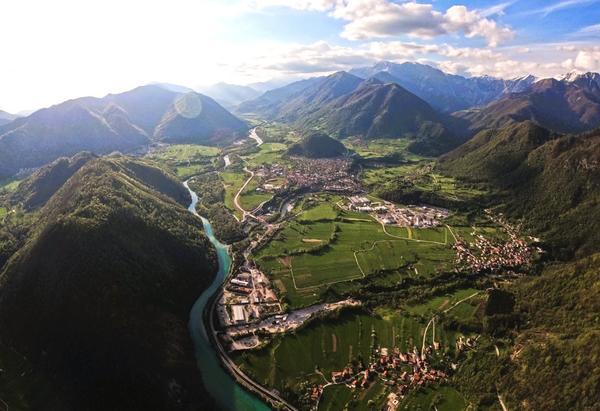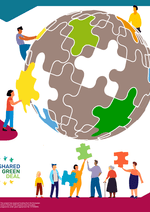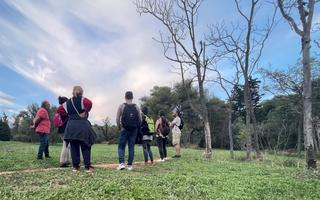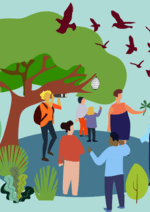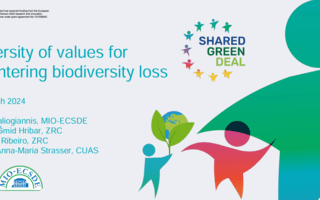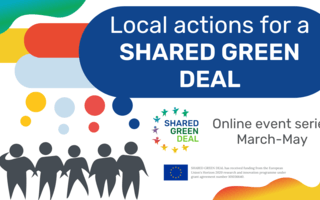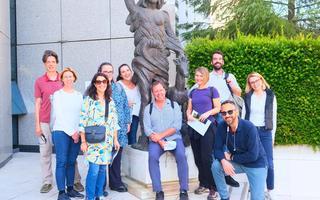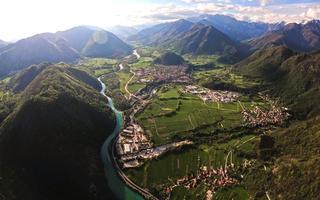Hot spot – nature writes stories and people with it
In this experiment the different values that people place upon the biodiversity of Tolmin are explored. A group of 13 adults is engaged to form a Study Circle, one that will reinforce participant’s existing values regarding biodiversity, and change or explore new ones This will be done via proactive involvement of participants through at least 9 meetings, during which the group’s action goals will be co-developed, leading to a public event for the community of Tolmin.
Local context
The Study Circle takes place in the Tolmin basin and its surrounding area, which is part of the Julian Alps Biosphere Reserve, whose main purpose is to maintain the balance between people and nature, biotic diversity and sustainable development with respect to preserving local cultural values. Tolmin basin is located at the junction of the Alps and the Dinarides and influenced by the Soča River. The Soča river is preserved there in its natural form.
Biodiversity is still insufficiently known and values associated with it are not well-recognized, especially in rural areas. Despite the inclusion of the sustainable development of the Julian Alps area in many regional and sectoral strategies that introduce sustainable approaches for the recovery of local biodiversity, there is little knowledge about it. The center, together with the Local Action Group, the Triglav National Park and the municipalities of Soča Valley, have been working on establishing a cross-border Biosphere Reserve in the Julian Alps area of the UNESCO Man and the Biosphere (MAB) Programme for the protection of its nature.
Specific needs and challenges
The target group also includes young parents and grandparents of pre-school and school-aged children. Due to their significant influence on the quantity and quality of time they spend with children in nature, experiment partners are keen to explore the different attitudes they have towards biodiversity. The aim is to help them understand nature better through direct research activities and proactive learning, to cultivate their interest and motivation for self-directed learning in this field and to investigate new ways for spending time in nature with children in a playful and educational way. Childhood is a key period to develop a positive attitude towards biodiversity, and teachers in formal education systems are not the only ones playing a key role in this.
Detailed description of the experiment
Initiatives cultivating education for preserving biodiversity in the area are mainly carried out by formal and non-formal programs for children and young people (mainly in classrooms) and less often for the general public and socially marginalised groups. The importance of biodiversity, not only as a source of providing various ecosystem services for the population but also for its role on human health, socio-economic impacts etc., can be fostered through lifelong learning. Therefore, there is the growing need to offer non-formal programs on this topic for adults of the area. The challenge is to develop non-formal educational and self-directed learning programs on nature protection for adults. In this process, partners will investigate adults' interest in biodiversity, find out what participants already know about it, what values they link to it and identify what they are more curious to learn more. By involving adults in this Study Circle, they aim to raise local awareness on the local biodiversity and cultural landscape, and at the same time promote lifelong learning. Additionally, the experiment will explore if this is an effective way to create a network of a community of practice for the Biosphere Region JA in synergy with other organisations for adult education and nature protection.
Involvement of the target group
One of the core objectives is to form a Study Circle of 10-15 adults that is intergenerationally diverse and balanced but also inclusive; adults will be able to participate regardless of gender, age, status, education, culture, etc. . Partners have extensive experience in adult education and through the years they have established a local learning community. During the COVID-19 pandemic lockdown, they reached and trained several isolated adults to use online tools and have been contacted again to invite them to join the nature-positive social experiment. Based on past experience, the anticipation is that the majority of participants in the learning group will be women (around 80%), however, the partners will strive for a balanced, yet diverse group.
Partners
Depending on the interest and needs of the participants, experiment partners beside the Posoški razvojni center will involve also, e.g. Triglav National Park, Institute of the Republic of Slovenia for Nature Conservation, Slovenian Forestry Institute, experts (biologists, ecologists, botanists, nature conservation supervisors) etc.
Local partner
Posoški razvojni center
Country
Slovenia
Number of inhabitants
10,953 (Municipality Tolmin)
City
Tolmin (Municipality of Tolmin, Upper Soča Valley, The Goriška region)
Website/social media
Contact person:
Patricija Rejec
patricija [dot] rejec [at] prc [dot] si
May 2023
Baseline promotion for participant recruitment
May 2023 - May 2024
Implementation of SCs (at least 9 monthly meetings)
May 2023 - May 2024
Promotion of social experiment and results:
Nov 2023
Lighthouse tour: Study tour for best practice exchange
Apr 2024
Questionnaire on biodiversity values
May 2024
10 Interviews with SC participants
May 2024
Final public event of SC
May-June 2024
Dissemination of results to adult educators
Related Green Deal Priorities
TIMELINE
Case Study Guides
|
Find out more


CONTACT
For further details please contact co-leads Professor Chris Foulds (chris.foulds@aru.ac.uk) and Professor Rosie Robison (rosie.robison@aru.ac.uk).

This project has received funding from the European Union’s Horizon 2020 research and innovation program under grant agreement No 101036640. The sole responsibility for the content of this website lies with the SHARED GREEN DEAL HAS project and does not necessarily reflect the opinion of the European Union.
